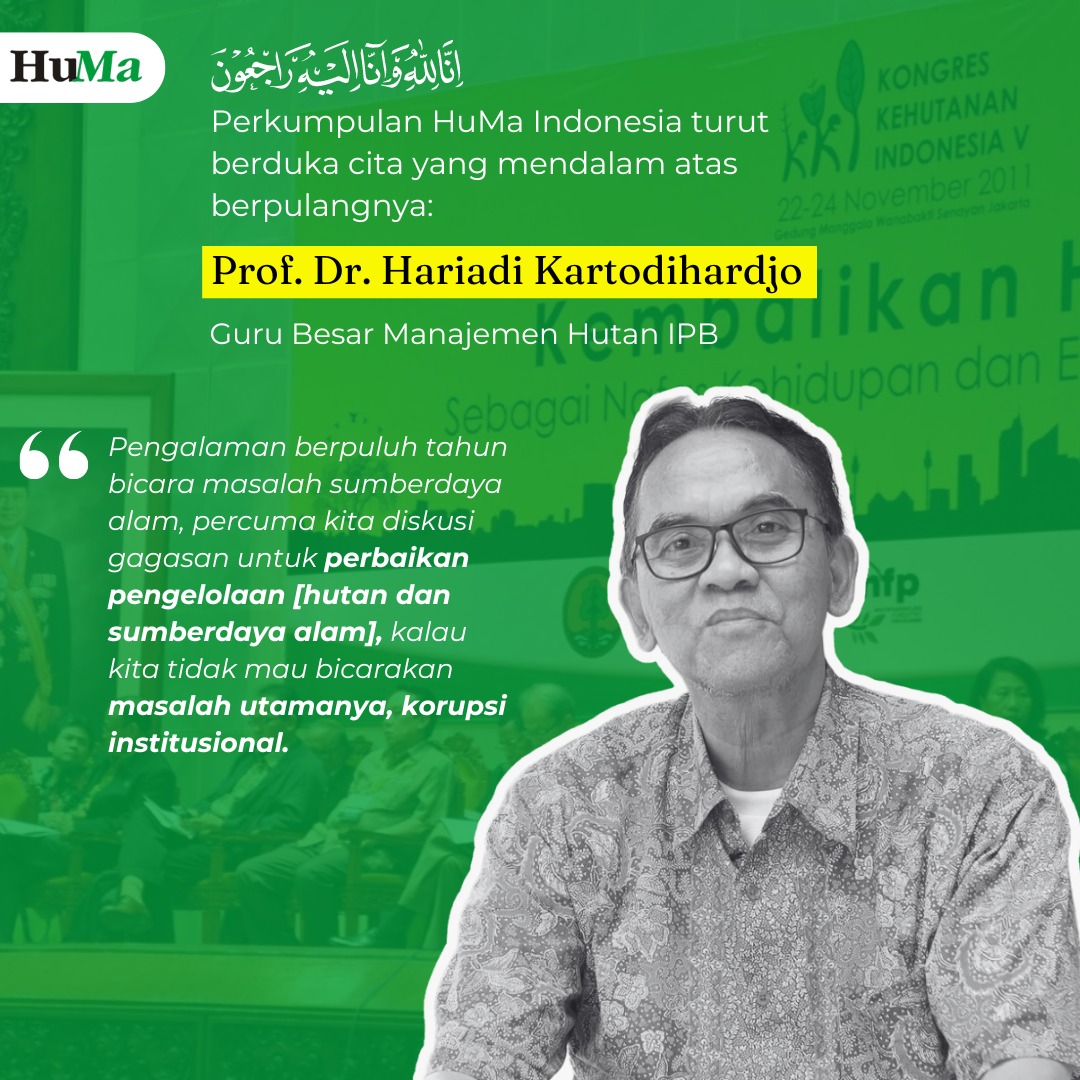Today, [8/6] marks the 7th day of the passing of Professor Hariadi Kartodiharjo (Prof. HK). HuMa has lost a truly special figure. Prof. HK’s contributions to people’s legal advocacy cannot possibly be summarized in this brief writing. Here is a small part of the many legacies of knowledge that we have learned from Prof. HK:

- Not the perpetuator of dominant ideologies
In repressive regimes, educational institutions consciously or unconsciously have the potential to reflect and legitimize views that favor the status quo, leading to the indoctrination of many students to adopt the same views. Prof. HK, with his empathy, sensitivity, and critical thinking, successfully criticized many established views related to forest management and natural resources, such as scientific forestry and political forestry. Prof. HK believed that forest management is not just a technical aspect that reduces the various functions of forests but should consider ecological, social, and well-being functions. Prof. HK also believed that state-defined forest areas based on political interests would not be sustainable for the environment and local communities.
- An educator and learner at all times, for everyone.
The time and energy given by Prof. HK were always the same in discussions with everyone, from indigenous/local communities, youth, civil society organizations, academic community, to public officials. Discussions with Prof. HK always felt close and reciprocal. In every discussion, Prof. HK as a professor not only shared knowledge unilaterally but also actively listened. It was not uncommon for Prof. HK to be the one taking notes of the discussions with the community in his notebook.
“I am also aware that many people love Father, after Father is gone, many come here and share stories of being helped by Father. Father never talks about helping people. Thank God maybe because of that, Father’s departure process was made easier by Allah,” said Mrs. Rosalia, the beloved wife of Prof. HK when chatting with HuMa staff at the 7-day recitation for Prof. HK. At Prof. HK’s residence, there were hundreds of flower arrangements sent by individuals and organizations from various backgrounds, from Ministers to youth groups. Prof. HK’s youngest son held various events commemorating Prof. HK in various places, from student organizations to indigenous and local communities.
- Strong scholarly foundation, yet interdisciplinary.
Prof. HK not only had a strong scholarly foundation as a forestry professor but always used an interdisciplinary approach in analyzing and solving problems. Because answering real field problems cannot rely on a single field of study. His involvement in various legal reform works, from the National Commission on Human Rights Inquiry Team for Indigenous&Local Community Forest Area Conflicts, Natural Resources Law Draft, Legal Reform Team, Corruption Eradication Commission Expert, various civil society advocacy works, and indigenous community advocacy, proved that Prof. HK was not exclusive and comfortable in just one field of study.
- Critical from formulating the problem
One of his messages in discussions with HuMa and other civil society organizations: “maybe we are making a third type of mistake [mistake in formulating the problem].” Among them, Prof. HK dared to argue that one of the root problems of forest and natural resource management in Indonesia is institutional corruption, “If we are not willing to discuss institutional corruption, it’s useless to discuss ideas for improving natural resource management.” The same thing was conveyed by Prof. HK without discrimination in front of officials, corporate lawyers, or the general public.
- Small acts of resistance discussions
His trust in the thinking ability of the younger generation was immense. When chatting with Prof. HK’s wife and youngest son today [8/6], one of Prof. HK’s dreams was to




0 Komentar
Tinggalkan Balasan